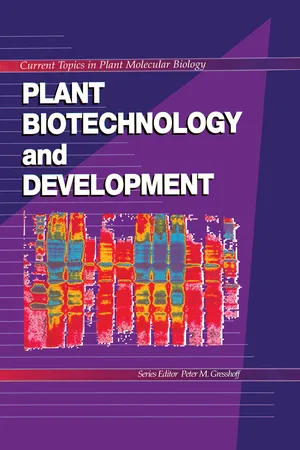
- 192 pages
- English
- ePUB (mobile friendly)
- Available on iOS & Android
Plant Biotechnology and Development
About this book
Plant Biotechnology and Development is the first of a series of publications designed to provide readers with an overview of current topics in plant molecular biology. Such an overview is important due to the fact that researchers from many disciplines are successfully turning their attention to plant development in an attempt to increase our understanding of the laws of nature itself. Plant molecular biology is a new field resulting from this scientific concentration and can be classified anywhere from the purely scientific to the practical and applied.
Plant Biotechnology and Development addresses biochemical as well as genetic analyses, in addition to morphological and evolutionary considerations. It emphasizes plant-microbe interactions, especially legume root nodule symbiosis. A glossary of terms is included at the back of the book to enable readers new to the field to "wade" through the jargon often associated with plant molecular biology. The book is fully indexed to allow easy access to information.
Plant Biotechnology and Development and the series "Current Topics in Plant Molecular Biology" will interest pharmaceutical researchers, geneticists, botanists, molecular biologists, cell biologists, biochemists, and others who would like to learn more about plant molecular biology and its influence on all disciplines.
Frequently asked questions
- Essential is ideal for learners and professionals who enjoy exploring a wide range of subjects. Access the Essential Library with 800,000+ trusted titles and best-sellers across business, personal growth, and the humanities. Includes unlimited reading time and Standard Read Aloud voice.
- Complete: Perfect for advanced learners and researchers needing full, unrestricted access. Unlock 1.4M+ books across hundreds of subjects, including academic and specialized titles. The Complete Plan also includes advanced features like Premium Read Aloud and Research Assistant.
Please note we cannot support devices running on iOS 13 and Android 7 or earlier. Learn more about using the app.
Information
Table of contents
- Cover
- Half Title
- Series
- Title
- Copyright
- The Editor
- Table of Contents
- Preface
- Chapter 1 DNA amplification fingerprinting and its potential application for genome analysis
- Chapter 2 The plant molybdenum cofactor (Moco)
- Chapter 3 Motility and chemotaxis in the life of rhizobia
- Chapter 4 Distinct entities between soybean agglutinin receptor and soybean root hair binding site on Bradyrhizobium japonicum cell surface
- Chapter 5 Rhizobium lipopolysaccharides; their structures and evidence for their importance in the nitrogen-fixing symbiotic infection of their host legumes
- Chapter 6 Molecular signaling in the Bradyrhizobium japonicum-soybean symbiosis
- Chapter 7 Cytokinins and legume nodulation
- Chapter 8 Nodulation in the absence of Rhizobium
- Chapter 9 Altered tryptophan biosynthesis in Bradyrhizobium japonicum gives enhanced nodulation and nitrogen fixation
- Chapter 10 Alfalfa nodule development; ribonucleotide pools and ribonucleotide reductase activity in cultured and symbiotic Rhizobium meliloti
- Chapter 11 Systemic regulation of nodulation in legumes
- Chapter 12 RFLP Linkage analysis of symbiotic mutants of soybean
- Chapter 13 Physical mapping of the nts region of the soybean genome using pulse field gel electrophoresis (PFGE)
- Chapter 14 Gene transfer to barley
- Chapter 15 Application of molecular analyses to questions relating to the genetics, ecology and evolution of actinorhizal symbioses
- Chapter 16 Intracellular receptor proteins for calcium signals in plants
- Chapter 17 Pathogen and pest resistance in endophyte-infected tall fescue
- Chapter 18 The commercial pathway for agricultural biotechnology
- Glossary
- Index